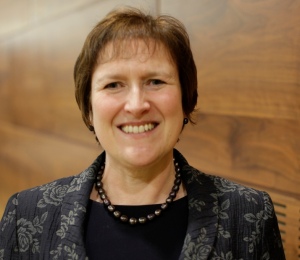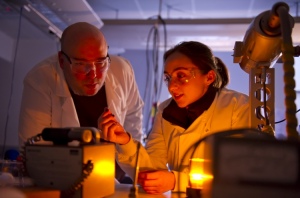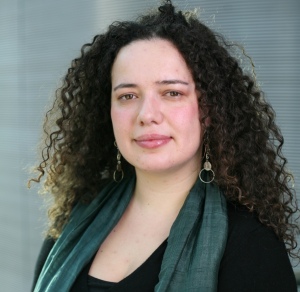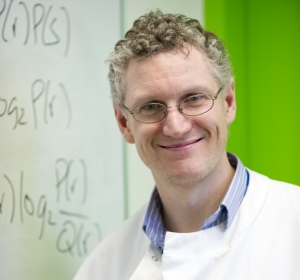Academics celebrate new positions in this year's promotions round

Seventy eight Imperial College London academics will begin the autumn term with new positions in recognition of their research and teaching successes.
The 2013 academic promotions round acknowledges the achievements of staff from the Faculties of Medicine, Engineering and Natural Sciences, the Business School and the Centre for Co-Curricular Studies. A full list of the 2013 academic promotions can be found in the College Notice [pdf] on the Central Secretariat’s web pages.
Below, we talk to four of the newly promoted staff – Professor Alex Blakemore, Dr Oscar Ces, Dr Marisa Miraldo and Dr Simon Schultz - about their work and what inspires them.
Professor Alex Blakemore

Professor Alex Blakemore
Alex Blakemore has trodden a unique path to becoming a professor. Due to family circumstances she had to leave school at 16, but at the age of 25 she returned to education, studying genetics at the University of Sheffield. There, Professor Blakemore gained both a degree and PhD whilst also bringing up three young children on her own. Later in her career, she remarried and had a fourth child, and so has a particular interest in supporting scientists with family responsibilities or diverse career paths.
Genetics is a subject that has fascinated Professor Blakemore from an early age. Her father was a nurse caring for people with severe learning disabilities, which meant that she met many people with learning difficulties as she was growing up. “I always wondered why they had those problems,” she says. “It was shocking to learn that in most cases, no one knew.”
Her research is focussed on understanding the health implications of genetic variation, including its relationship with obesity, autism and psychiatric illness. A particular interest is copy number variation – changes in the genome that result in cells having extra copies or missing copies of sections of DNA. “We used to think that you got one copy of each gene from your mum and a second copy from your dad, but it’s not as simple as that - it’s quite normal to have extra copies or missing copies. We’re interested in the effects of these copy number variants on health and disease.”
Professor Blakemore is also the Faculty of Medicine’s Ambassador for Women, working to promote women’s careers in science and supporting women in the faculty. “Some young women still think they can’t mix a career in science with having a family, and we need to help them realise that they can.”
Dr Oscar Ces

Dr Oscar Ces (pictured with Dr Hanna Barriga)
Dr Oscar Ces is co-chair of Imperial's Institute of Chemical Biology. He has just been promoted to Reader in Chemical Biology & Membrane Biophysics in the Department of Chemistry.
In his research life he develops technologies to study and manipulate biological systems at the single cell level, one day hoping to manufacture artificial cells that are capable of sensing and responding to their environment.
Having gone to school just down the road in Pimlico and then Fulham in later years Imperial has always felt like home. “When we used to visit the Science Museum on school trips I never thought I would end up working just next door one day,” says Dr Ces.
"I have always been fascinated by how cells work and the fact that no two cells are quite the same. Despite the individual nature of cells most techniques rely on population based averages to measure their contents, which means we lose key information about cellular heterogeneity and are limited in our ability to study cells that are only available in small quantities like stem cells.
"The analogy I often allude to is that of an alien coming to earth to figure out how the human race works. The last thing you would want to have to do is put the entire human race in a blender to then only be able to make one measurement. What you would want to do is take apart each human and study them one at a time to build up a picture of how we work!”
Dr Ces is also Director of its Centre for Doctoral Training in Chemical Biology, training over 145 PhD graduates to pursue careers in industry and academia, over 85% of whom go on to further careers in science.
Dr Marisa Miraldo

Dr Marisa Miraldo
Dr Marisa Miraldo in the Centre for Health Management has been promoted to Associate Professor in Health Economics. After growing up in central Portugal, where she completed her undergraduate studies in economics, she moved to Belgium to complete her Masters degree, before travelling to Spain and then the UK for her PhD studies. She joined Imperial in 2008 following academic positions at the University of York.
An expert in public policy and pharmaceutical economics, Dr Miraldo is particularly interested in regulation and competition in the health care sector and, more generally, the public sector. She has worked on research projects for the UK Department of Health exploring competition and regulation in secondary and primary care; competition between public and private providers; and the impact of public policy on pharmaceutical firms' strategies.
Dr Miraldo said: “I have always been very passionate about people and what affects their lives. I decided to pursue an academic career where my work could have an impact on people’s lives and contribute to a better society. I believe that health economics and policy is an area where there is a serious need for research that can achieve those aims. I am inspired by considering people’s needs and looking at the mechanisms put in place by policymakers to improve people’s wellbeing.”
Dr Simon Schultz

Dr Simon Schultz
Dr Simon Schultz, promoted to Reader in the Department of Bioengineering, has been director of the Neural Coding Laboratory since 2004. His work focuses on neuroscience. In particular, he aims to understand in more detail how a part of the brain called the cerebral cortex - responsible for awareness, thought, language and consciousness - processes information. Developing a better understanding of how this part of the brain works could ultimately help to combat degenerative diseases such as Alzheimer’s.
Dr Schultz says: “I began my career as an electrical engineer and soon moved to the world of neuroscience after I realised that there is so little we still know about how parts of the brain such as the cerebral cortex works and I became hooked on trying to learn more about how it functions. Since then I have been focusing on applying new techniques for studying how information is processed in this part of the brain.”
Article text (excluding photos or graphics) © Imperial College London.
Photos and graphics subject to third party copyright used with permission or © Imperial College London.
Reporter
Laura Gallagher
Communications Division
Simon Levey
Communications Division
Colin Smith
Communications and Public Affairs
Sam Wong
School of Professional Development